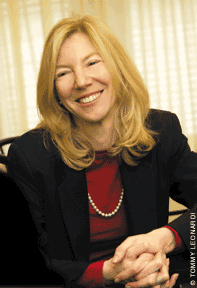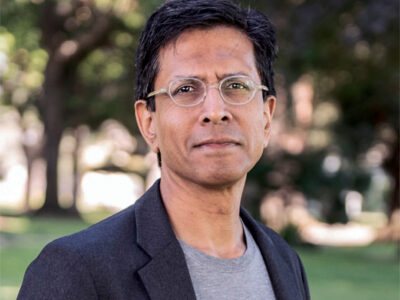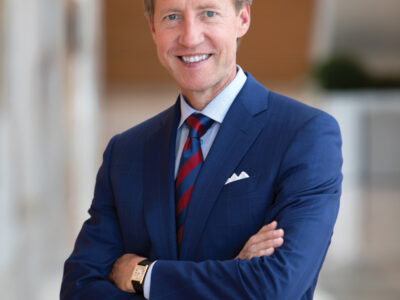
It was the last question and answer at the January 23 press conference to announce Princeton University Provost Amy Gutmann’s nomination as Penn president, and perhaps the most telling.
A reporter from The Daily Pennsylvanian, with which all Penn chief executives periodically joust, reminded Gutmann that she’d been quoted in 2001 in Princeton’s student newspaper as saying that she did not want to be a university president and asked, “How has this changed since then?”
When the audience’s laughter died down, Gutmann answered, “I don’t want to be a university president. I want to be Penn’s president.”
With the February 20 vote of the full board of trustees confirming her appointment, that wish has been officially granted. The 54-year-old political scientist and philosopher, who besides serving as provost holds the Laurance S. Rockefeller University Professorship of Politics and the University Center for Human Values at Princeton, will take office as Penn’s eighth president on July 1, succeeding Dr. Judith Rodin CW’66, who announced last summer that she would step down after 10 years of service.
Accepting the nomination, Gutmann said she was honored and “exhilarated by the prospect of becoming Penn’s president,” and thanked Penn Board of Trustees Chairman James S. Riepe W’65 WG’67 and the search committee who recommended her. She called Penn “a powerful force in the Ivy League of higher education,” with a “spirit that I associate with its founder, Benjamin Franklin, and all that is wonderful about American democracy.
“Penn’s excellence is electric,” she added. “It is pragmatic and principled, it is urban and international, it is multicultural and multidisciplinary, it’s demanding and diverse, it’s collaborative and collegial, and it’s energetic and entrepreneurial. I am looking forward, come July, to beginning a new chapter of my education in this electric and excellent place called Penn in the great city of Philadelphia.”
Gutmann emphasized her eagerness to relocate to Philadelphia—specifically, the president’s house in Eisenlohr Hall—with her husband, Michael W. Doyle, the Harold Brown Professor of Law and International Affairs at Columbia University. (Their daughter, Abigail, is a doctoral student in chemistry at Harvard.)
“I will move from Princeton, my home of 28 years, to my new home, in Philly, for which I already have enormous admiration and attachment,” she said. “I look forward to working in this dynamic city with Mayor [John] Street, Councilwoman Jannie Blackwell, and other city officials, to continue the progress made on strategic plans for the post office and the Civic Center site. And I look forward, as well, to working with Governor [Edward] Rendell [C’65 Hon’00] and state officials in this great state of Pennsylvania.”
As provost at Princeton since September 2001, Gutmann has served as the school’s chief academic and budgetary officer, reporting to the president. She’s been on Princeton’s faculty since 1976—teaching political philosophy, democratic theory, the history of political thought, and practical ethics—and served as dean of the faculty from 1995-97 and academic advisor to the president from 1997-98. She was the founding director of the University Center for Human Values, a multidisciplinary center that supports teaching, scholarship, and public discussions on ethics and human values.
Her books include Identity in Democracy (2003); Democratic Education (second edition 1999); Democracy and Disagreement (1996, with Dennis Thompson), and Color Conscious (1996, with K. Anthony Appiah). She has also edited volumes in moral and political philosophy, practical ethics, and education; and written more than 100 articles and essays in scholarly publications, as well as reviews and occasional essays for general publications such as The New York Times Book Review, Dissent, the Times Literary Supplement, and The Washington Post.
Gutmann received her undergraduate degree from Radcliffe College, an M.Sc. from the London School of Economics, and her doctorate from Harvard University. In 2003, Harvard awarded her its Centennial Medal for “graduate alumni who have made exceptional contributions to society,” and she received the President’s Distinguished Teaching Award at Princeton in 2000, among numerous other honors for her scholarly work in higher education, political science, and human rights.
The current president of the American Society of Political and Legal Philosophy, Gutmann is also a fellow of the American Academy of Arts and Sciences, the American Academy of Political Science, and the National Academy of Education. She has been a visiting scholar at the Stanford Center for Advanced Study in the Behavioral Sciences, Princeton’s Institute for Advanced Study, and Harvard’s Kennedy School of Government.
In a statement following the announcement of Gutmann’s nomination, Princeton University President Shirley M. Tilghman praised Penn’s choice as “excellent” and called Gutmann an “exceptional teacher and scholar” who has served with “great distinction” as dean of the faculty and provost. “We will greatly miss her strong leadership and wise counsel. I look forward to continuing to work with her in her new role as president of our closest Ivy neighbor.”
One of the reasons President Rodin gave for announcing her departure a full year in advance was to provide ample time to select a successor and ensure a smooth transition to maintain Penn’s strong momentum [“Gazetteer,” September/October]. During her tenure, Penn has advanced in virtually all areas, becoming more selective in admissions; rising in the rankings; and attracting ever higher levels of research grants and financial support from alumni and friends, foundations, and corporations. In addition, a building boom transformed the campus, and the University forged stronger relationships with the surrounding community through efforts such as its leadership of the University City District and partnership with the Philadelphia school district and teachers’ union to create the Penn-Alexander School. Late last year, the University came to an agreement with the U.S. Post Office to secure a long-coveted parcel of land between the eastern edge of campus and the Schuylkill River for development [“Gazetteer,” November/December].
In early September, a 21-member consultative search committee made up of trustees, faculty, and students was named, with Riepe as its head, and charged with recommending one or more candidates to the executive committee of the board of trustees, which in turn is responsible for nominating a candidate for election by the full board of trustees under Penn’s rules for presidential succession.
The committee began its deliberations by collecting input from various Penn constituencies [“Gazetteer,” November/December] and developing a set of priorities for the University, challenges facing Penn in the years ahead, and the resulting characteristics needed in a new leader. Only then did it move to interviewing potential candidates. Exactly who was considered remained a closely guarded secret, though a number of possible names—never confirmed or denied—surfaced in various local media, including The Philadelphia Inquirer, Philadelphia Magazine, and The Daily Pennsylvanian. Carnegie-Mellon University President Jared S. Cohon CE’69 was moved to declare his non-candidacy after his inclusion in one short-list prompted anxious questions from students and officials at his home institution. Other rumored candidates included National Security Advisor and former Stanford Provost Condoleeza Rice; Drew Faust, who was Annenberg Professor of History at Penn before moving to Harvard to become founding dean of the Radcliffe Institute for Advanced Study; and Nancy Cantor, chancellor of the University of Illinois at Urbana-Champaign, as well as Gutmann.
At the press conference, search committee member Barbara D. Savage, the Geraldine R. Segal Professor of American Social Thought in the School of Arts and Sciences, credited Riepe with doing “a masterful job as chair in establishing a truly collaborative process for us and one that was marked by his own integrity and patience and efficiency, and by a great sense of humor.”
One reason the deliberations moved “so smoothly,” she said, was the considerable time spent early on “really trying to arrive at a common understanding of Penn’s many strengths and its achievements over the last decade under President Rodin’s excellent stewardship.” In that effort, she added, “our benchmarks always were to be true to our dual commitments to excellence and to diversity—two ideals we saw not only as entirely compatible, but as mutually interdependent.” Those ideals created the framework for “detailed discussions about priorities and resources” for the present and future of Penn and to arrive at “a set of shared values, a constellation of abilities, and a portfolio of proven experience that we hoped to find in the ideal candidate.”
In life, she added, the ideal isn’t often realized—“but this is one of those rare moments.” In Gutmann, “We found someone who was an extraordinary scholar, a person of deep commitments and integrity, someone with a wealth of experience, and someone who understands all that Penn is and all that it can be. And, finally and importantly, someone who shares our commitments to both excellence and diversity.”
The search that culminated in Gutmann’s nomination took five months. That struck a number of observers as exceptionally swift—a notion that seemed to bemuse Riepe both at the press conference and in a later interview. “That’s the difference between academia and the commercial world, I guess,” he said. “Five months is a lifetime in our business.”
A week after the nomination, from his Baltimore office at T. Rowe Price Group, Inc., where he serves as vice chairman, Riepe praised the committee’s efforts. “Everybody who was involved understands the importance of picking the senior leader,” he said. “Everybody made contributions to the process and hopefully everybody felt included.”
Riepe has a pragmatic attitude toward the search process, noting that, at the start, it’s “like a funnel, and you collect a lot of names from a lot of places and sort through them.” It soon becomes clear, he added, that there is a “relatively small pool” of people who are 1) qualified for the job, 2) interested in the “very tough assignment” of leading an institution as president, and 3) available “while the window that you are looking through is open.”
From the start, Gutmann was in the pool “because of her position and her experience” at Princeton and ultimately emerged as the candidate who best met the criteria set by the committee for the characteristics needed for Penn’s next leader. “I think she’s right on them, frankly,” he said.
(It didn’t hurt that she also likes red and blue. Besides dressing in Penn’s colors for the press conference, she also wore them to her final interview, said Riepe. “We complimented her on her sartorial standards, and she said she hadn’t even had to go out and buy it [for the occasion]—whereas no one has any orange and black, except for one night a year.”)
The selected characteristics did not include being an alumnus or alumna of the University, Riepe noted. “We considered ourselves very fortunate that we found an alumna in our last search, but we recognized—because of what I said about the size of the eligible pool—that, while that would be an attractive characteristic, we simply weren’t going to be able to have it as a requirement,” he explained. “We had a few candidates—not undergraduates—who had a degree, but the majority of this eligible pool had no direct affiliation with Penn.”
Nor, despite suggestions to the contrary in The Daily Pennsylvanian following the announcement, was there a requirement that the successful candidate be “someone who knew all about academic medical centers,” which, said Riepe with a laugh, “would have really taken the pool way down.” Rather, it was noted that “one of the challenges was going to be to operate a major academic medical center, and so we wanted someone that we were confident could oversee that—and we had that,” he explained.
The top three characteristics were “demonstrated leadership with an ability to develop and implement a vision for the future”; “credibility as an academic leader, one who values excellence in teaching and research”; and “strong management and financial oversight skills,” Riepe said. “In our view, she met all of them.”
In her role as dean of the faculty at Princeton and, since 2001, as provost, “it was very clear she had demonstrated leadership,” he said, “and in our interviews, and of course in all the references, we became convinced she expressed the vision.” A leading scholar with a longtime commitment to teaching, Gutmann also knows her way around a financial statement. “She got tremendous reviews both as dean of the faculty and in the provost role” on that score, he said. “She was very strong on budgets, and a number of people said she was just absolutely great with numbers, even though she is a social scientist.”
Possession of “strong fundraising skills”—another desired characteristic—is to some extent a matter of speculation unless the candidate is a sitting president, said Riepe, but as founder and organizer for Princeton’s Center for Human Values, Gutmann “raised a $100 million endowment starting from the first dollar.” With the center and also as dean of the faculty, she also showed a talent for the fifth item on the list—“the ability to identify, attract, and retain talented people.” Given that one of Penn’s “highest priorities is strengthening the quality and depth of faculty,” he said, “to us that was a very important asset.”
Gutmann’s scholarship demonstrated her “ability to engage diverse constituencies and a commitment to diversity,” he added. “I think that’s the answer to the question, ‘What are you doing taking somebody out of this suburban school and dropping them into West Philadelphia?’ You can imagine we spent a lot of time talking with her about [that], and we were very convinced that because of all the scholarship she had in that area that her commitment to diversity, her interest in the cities, was both sincere and longheld.”
As for the last characteristic listed—“excellent communicator”—“you can draw your own conclusions,” he said, referring to her performance at the press conference announcing her nomination. She also amply demonstrated one more characteristic which, while not listed formally, is essential to the job, said Riepe: “High energy.”
In early February, Gutmann took time in the midst of a day of meetings related to her “day job” to talk about her selection as Penn’s next president and the duties she’ll take up this summer.
“I was very impressed by how directed all the members of the [search] committee were and how thorough they were in the questions they asked me. It was clearly a very well thought-out and executed process—but I would of course be pleased with it,” she said with a laugh. “Seriously, many people who were contacted commented to me afterwards on how thorough and careful they thought the members of the committee were in the way they proceeded.”
From her perspective, the Penn presidency is “a great fit.”
“Penn is a very distinctive university in that it’s got almost all, if not all, the professional schools at a very high level of excellence and a great liberal arts university and college at its heart,” she said. “A lot of my own scholarship and teaching has crossed boundaries between the liberal arts and the professions. Add to that the fact that Philadelphia is a wonderful city and that I would be delighted—as would my husband—to live in Philadelphia, and it was a package that for me was made in heaven.”
The city’s relative proximity —“an hour down the road”—was a consolation for any pangs at leaving friends in Princeton, she added.
“There are two things about Penn: one is its level of excellence across a wide spectrum in a great urban setting, and the other is the fit with what I care about and would love to contribute to,” she adds. “I think one needs both of those things. I did not ever have an ambition to be generically a president [of a university]. It’s being president of Penn that really resonates with what I feel I can do in the next stage of my career.”
In its relationship with the city, Gutmann sees the University as both benefactor and beneficiary. “What Penn can do with its integration of liberal arts and sciences and the professional schools is both contribute to making Philadelphia a more vibrant city and, as importantly, have the city contribute educationally to the students and scholars at Penn by being a kind of academic laboratory,” she said.
“Since cities are very cosmopolitan places, that enables Penn to excel in a whole variety of studies that are urban in nature and also to be a more international and cosmopolitan university. I would like to build on that even more,” she added, citing examples such as Penn’s service-learning initiatives and leveraging the University’s expertise in areas such as law, medicine, and economics.
Gutmann also looks to continue to advance the University’s building projects in research, academic facilities, and residential living. “It’s absolutely essential that we build for the expansion of the medical school and [health] system,” she said. “To do great science one has to build. To have better residential areas for faculty and staff to live is really important for the well-being of an urban university. To make sure that the dormitories and other possible living places for undergraduates are in really excellent shape, and that there are enough of them, is also very important. So I don’t see any better alternative than to put a significant amount of attention into what the immediate environment is around Penn, and that’s just building on the exemplary job that Judy Rodin has done.”
As Princeton’s provost, “I have spent a lot of time over the last two and a half years—and an increasingly great amount of time—in our facilities projects,” she said. “We have a plan that spans five years [involving] about a half-billion dollars worth of buildings, and I am very actively involved in that, as well as budgeting for all of our capital and renovation projects and our operating budget. All of that is in my office, and I take a very keen interest in it.”
Gutmann traces her financial skills to an early gift for mathematics. “When I went to college, the reason I think I got into an Ivy League institution is I was keenly consumed by math,” she said. In fact, Gutmann was initially admitted to Harvard-Radcliffe with sophomore-standing straight out of high school as a math major. “Then I got interested in other things, but I never gave up my interest in things mathematical and financial,” she said. “One of the reasons I loved being provost is it enabled me to combine my interest in humanities and social science with doing things that are financial.”
She also seems undaunted by the prospect of competing for top students against schools with much larger endowments than Penn. “Those endowments didn’t just appear like manna from heaven,” she said. “There was fundraising and a vision that led alumni over time to give money to those institutions, and I see that as part of Penn’s trajectory—which is to build up the endowment base that enables a great university to support bringing the best and the brightest students in, regardless of their family income. That is something that I know the trustees are devoted to, and I think we should run with it.”
At the press conference announcing Gutmann’s nomination, President Rodin joked that the University’s thrifty Founder would have approved the choice of a successor who could fit into her academic robes. With Gutmann’s election, Penn becomes the first Ivy League institution to have back-to-back female presidents, but Gutmann acknowledges concerns that she does not share another salient feature in Rodin’s biography—a Penn degree.
“It is probably a flaw somewhere in my background that I didn’t go to Penn,” she said, “and so it’s fair to point that out—but not to extrapolate from that anything less than a totally avid commitment from here on in” to the University.
Not having experienced life as a student here will not affect her approach to the presidency, she added. “I care tremendously about undergraduate as well as graduate education. If I didn’t, then I think not being an alumnus of the College could be a problem—because in a place that has so many excellent graduate schools, the undergraduate college could get short shrift,” she suggested. “I’m absolutely committed to that not being the case, and I think everybody who knows me knows how much I care about teaching both at the undergraduate level and the graduate level. I think Penn’s genius moving forward is that it can do both undergraduate and graduate education in an integrated way.”
During the transition phase, Gutmann said she will “try and carve out some time each week when I can learn about Penn from the people there—who I couldn’t talk to during the search, but I now want to hear from. I will do as much of that as possible between now and July 1st, but starting July 1st, I will be fulltime at Penn. And then the fun begins.”
Among the new president’s top priorities will be filling some high-level posts, including hiring a vice president for development and alumni relations, vacant since Virginia B. Clark resigned in July 2002 and put on hold when Rodin announced her plans to step down, and to replace vice president and chief-of-staff Pedro Ramos C’87, who recently departed College Hall for a City Hall position (see story on page 27).
While Riepe expressed understandable relief that the search process is over, he added that leading the effort was a learning experience for him—and a pleasant one. “Part of this process is calling around to other presidents and other board chairs when you collect names, but at the same time you’re asking questions about how your university is seen out there,” he said. “Penn is seen as one of the lead institutions, and within the Ivies it is seen as the one institution that is really moving—and we got that in a number of ways from a number of people. And our incoming president believes that.”
Recognition of Penn’s distinctive urban identity was another feature: “Not just being in a city, but what [Penn] has done with the city and its neighborhood, and I found that very encouraging.” Overall, Riepe added, “I was just pleased with how desirable the position was seen as being.” There had been worries in some quarters that having to follow in Rodin’s very successful footsteps might turn some people away, but “we didn’t run into that at all,” he said. “People saw that as a plus; they said it made the institution that much more attractive. For me personally, that was my most pleasant surprise.”
—J.P.




